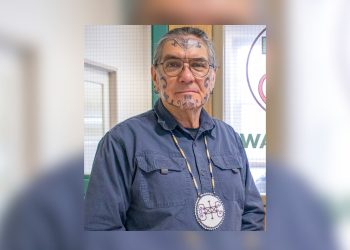A newly published Wolastoqey dictionary started as a pandemic project, says editor Roseanne Tremblay Clark.
“It was when COVID hit five years ago, is when I started,” she said in an interview with the NB Media Co-op. “And I got to thinking, ‘What am I going to do with myself?’ So I just happened to be looking through my language materials I had accumulated.”
She figured it was a good project during the isolation. “I’ve been working at language now for probably 35 or 40 years,” she said. “So, I thought, ‘Geez, I got a lot of stuff here…There’s no sense in me keeping it. I should get it out there.’”
Watch the full interview with Roseanne Tremblay Clark and Wolastoq Grand Chief Ron Tremblay:
She turned the idea into a collaborative project with her family, which has grown into a online dictionary and a 424-page book called Words from the Crow Clan.
“I called every one of my siblings, nine of them, and I explained to them, I said, ‘What would you guys think if we do a family dictionary?’ And they were all on board, not one of them hesitated,” she recalled.
“A lot of the words, they came quite easily, but some we really had to dig for and have discussions about them,” Roseanne said.
Ultimately, the experience was enjoyable for the family, a chance for the siblings to reminisce.
“It was really quite fun … ‘Remember when Grammy used to say this? Remember Mom said this to me?’ It was really a lot of fun, we had a lot of laughs and just a lot of memories coming back.”

Before publishing the 424-page book, they launched an online dictionary. Roseanne noted the exact date that it appeared online: Dec. 2, 2023.
At first, it had 6,000 entries, a number that has grown to 22,000 in less than two years. All entries include audio clips to demonstrate the pronunciation.
Later, Roseanne realized that the online dictionary might not be accessible enough. “I got thinking about the Elders,” she said. “Some Elders do not have access to computers. They don’t know how to get on a computer.”
She also realized that if she lost the online dictionary, she would lose all her family’s work.
One thousand copies were published, and under the terms of a funding arrangement with Heritage Canada, the books cannot be sold. Roseanne has been giving them away, and now she’s down to about 100 copies.
“We’ve been giving it to all the Wolastoqey communities in the schools, libraries, Elders, speakers,” she said. “People are interested in it.”
Roseanne hopes to expand the project in the future, if she can secure more funding. “In another two, three years I wouldn’t mind having a second edition.”
The next edition would include additions to the online dictionary since the release of the first book, as Roseanne continues to update the growing website.
Her background with the language began at birth. “That’s the first language I heard when I was growing up,” she said.
“My aunt had a store in our community, and she would hire me to sell newspapers to each house, and I remember going to every home. All I heard was Wolastoqey being spoken. That would have been in the 60s. So, it’s really quite different today, but it was everywhere,” she recalled.
“This is not an exhaustive list of our language there, and we know, and we’re not the experts. I want to make that very clear,” she said. “We only shared what was taught to us.”
Her brother, Wolastoq Grand Chief Ron Tremblay — also known by his spirit name, spasaqsit possesom — also worked on the book.
He recalled one of the benefits of speaking Wolastoqey when playing baseball against teams that didn’t understand the language.
“We didn’t really need hand signals or signs because we spoke the language,” he said. Instead, they would listen to the coach giving direction in Wolastoqey,
“Then the pitcher and catcher can speak back and forth, what kind of pitch would be coming… So the other team wouldn’t quite get what the heck we were saying, and that was the gift of the language.”
Roseanne is concerned about preserving the language today.
“Well, we all know that our language is dying. We have very few speakers. I think in my community, we might have less than 80,” she said.
She has some advice for young people. “I encourage them to be around speakers as much as possible,” she said.
“Time’s ticking away, and every time I lose a speaker it just breaks my heart,” she continued. “They take a chunk of our dictionary with them forever, and we’ll never get it back.”
She stressed the importance of working together. “The younger kids need us, and we need them. They need us to help them with language, and we need them to learn it and to carry it on for us. We’re not going to be here forever.”
Ron is optimistic about language revitalization. “Yes, I really have confidence in our young people,” he said. “I know that there was a time and space where I felt that, “Oh geez, nobody wants to learn.’”
He believes in the importance of language immersion. “We need immersion programs, and I wish the government, and the communities would spend more of their money towards that, because that’s the only way we’re going to preserve it.”
Ron frequently performs ceremonies that involve language teachings, partly as a way to connect with ancestors.
He recalled a message that stuck with him: “Before we all pass, we need three things. We need our language so we can talk to the ancestors once we cross over, and we need our death song, and we need our traditional spirit names.”
That message made a strong impression on the Grand Chief.
“I want to teach young people to try to speak their language first and foremost, and even though they may make mistakes, we will try to assist them in a very kind way.”
Roseanne noted that two major Wolastoqey writing systems exist, sometimes resulting in arguments in the community.
She believes in using the writing system you’re most comfortable with. “There’s no right or wrong to this. We’ve got to just toss that aside and say, ‘Okay, how are we gonna do this all together?’ We have the same goal.”
Anna-Leah Simon is a St. Thomas University student and a member of Elsipogtog First Nation. NB Media Co-op staff reporter David Gordon Koch contributed video editing and production. This reporting has been made possible in part by the Government of Canada, administered by the Canadian Association of Community Television Stations and Users (CACTUS).


![Wolastoqey dictionary grew from pandemic project into website, book [video]](https://nbmediacoop.org/wp-content/uploads/2025/05/WolastoqeyDictionaryMay152025-750x536.jpg)
![Interview with Anita Joseph, winner of the New Brunswick Human Rights award [video]](https://nbmediacoop.org/wp-content/uploads/2025/11/AnitaJoseph-2-350x250.jpg)
![Elsipogtog comic convention to return in 2026 following first-ever event [video]](https://nbmediacoop.org/wp-content/uploads/2025/08/Screenshot-2025-08-28-at-13.47.38-350x250.jpg)


![‘Continuum of genocide’: Pentagon funding of Sisson mine provokes renewed opposition from Wolastoq Elders [video]](https://nbmediacoop.org/wp-content/uploads/2025/07/SissonMine-2-120x86.jpg)



